Despite the filing, there are still challenges ahead for XRP ETFs due to the SEC’s ongoing legal battle with Ripple over whether XRP is an unregistered security. Meanwhile, Bitcoin ETFs saw outflows yesterday, with Fidelity and Grayscale leading the losses. Additionally, Ethereum ETFs also experienced outflows. Meanwhile, a Kraken survey revealed that most crypto investors favor dollar-cost averaging (DCA) to manage volatility.
Canary Capital Eyes XRP ETF
Canary Capital submitted a filing to the US Securities and Exchange Commission (SEC) to launch a spot XRP exchange-traded fund (ETF). This makes it the second proposal for an XRP ETF in the past week. The firm wants to provide investors access to the XRP market through a traditional brokerage account, bypassing the complexities and risks that are associated with directly buying and holding the crypto.
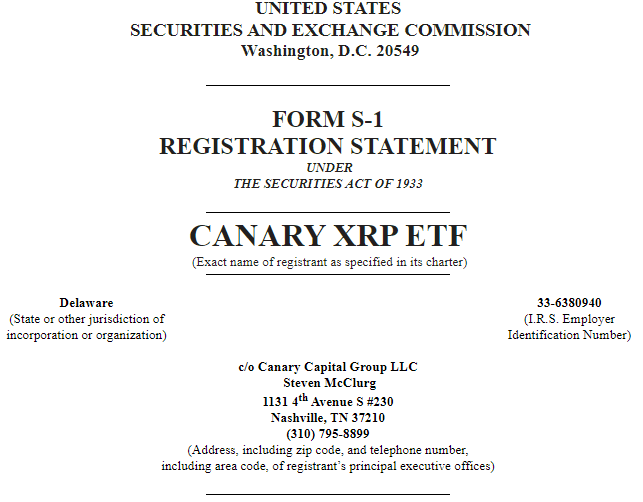
Canary Capital’s XRP ETF filing (Source: SEC)
According to Canary Capital's filing on Oct. 8, the proposed ETF will track the price of XRP through the Chicago Mercantile Exchange (CME) CF Ripple index, which is a real-time price benchmark. The fund will avoid using derivatives products, as the firm believes they could expose investors to additional counterparty and credit risks.
Canary Capital is confident that its ETF design will allow investors to utilize XRP much more efficiently in their strategic and tactical asset allocation strategies by investing in shares of the ETF rather than directly trading the cryptocurrency. However, the firm did not reveal any details about the ETF’s custodian or specify the ticker symbol under which the fund will be listed.
This filing was submitted just one week after crypto asset manager Bitwise submitted its own application for an XRP ETF to the SEC on Oct. 2. If either Canary Capital’s or Bitwise’s proposal is approved, it will be the first spot XRP ETF to get regulatory approval in the US market.
Despite these applications, there are still many hurdles to the SEC’s approval of any spot XRP ETF, especially because of the ongoing legal battle between the SEC and Ripple. The regulator still holds firm that XRP is an unregistered security, and alleged that Ripple raised $1.3 billion through its token offering.
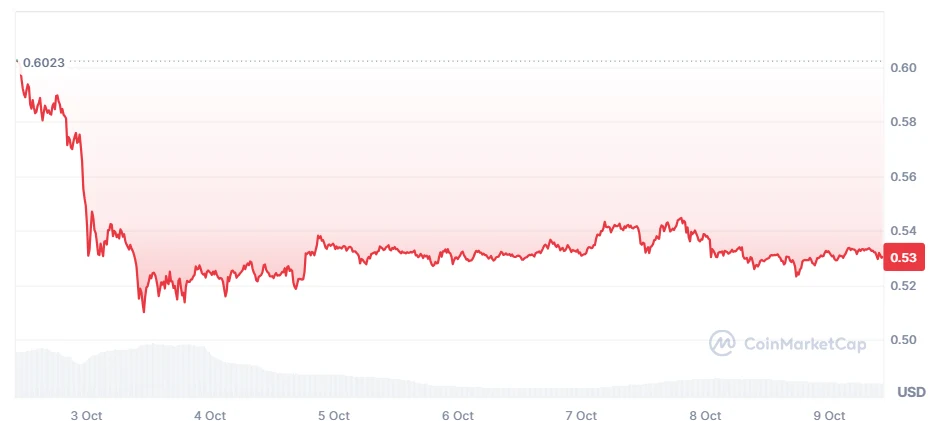
XRP’s price over the past week (Source: CoinMarketCap)
At press time, XRP was trading hands at $0.5302 after its price managed a slight 0.44% increase over the past day. According to data from CoinMarketCap, XRP’s price was still in the red by over 11% on its weekly time frame.
US Bitcoin ETFs Lose $18.66M
While the jury is still out on whether the crypto space will see XRP ETFs anytime soon, spot bitcoin ETFs were faced with more outflows yesterday. These US spot bitcoin ETFs saw $18.66 million in net outflows on Tuesday, ending a two-day streak of positive inflows.
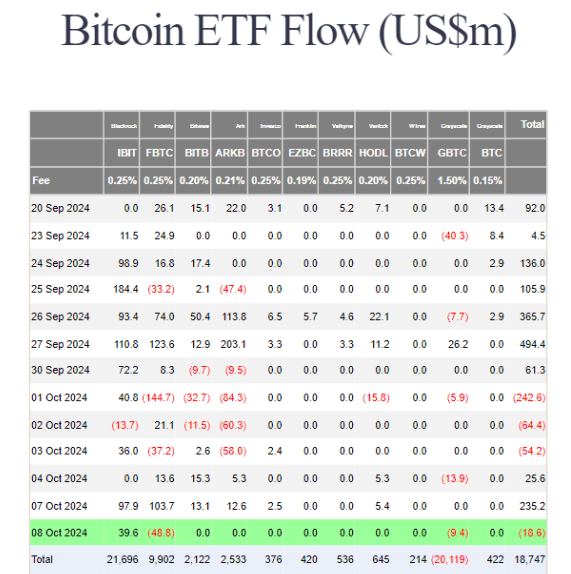
Bitcoin ETF flows (Source: Farside Investors)
Fidelity’s FBTC led the outflows, with $48.82 million exiting the fund, while Grayscale’s GBTC also experienced outflows of $9.41 million after seeing no activity the previous day. BlackRock’s IBIT, which is the largest spot bitcoin ETF, was the only fund to record inflows, with $39.57 million entering the product. The remaining nine bitcoin ETFs reported zero flows.
The total trading volume for the 12 bitcoin ETFs reached $1.35 billion on Tuesday. This was up from the $1.22 billion registered on Monday.
In the Ethereum market, US spot ETH ETFs recorded $8.19 million in net outflows on Tuesday after a day of no flows on Monday. Bitwise’s ETHW saw the largest outflows, with $4.54 million leaving the fund, while Fidelity’s FETH logged outflows of $3.65 million. The other seven ether ETFs saw no changes in flows.
The total trading volume for the nine ether ETFs dropped to $102.37 million on Tuesday, compared to the $118.43 million the previous day.
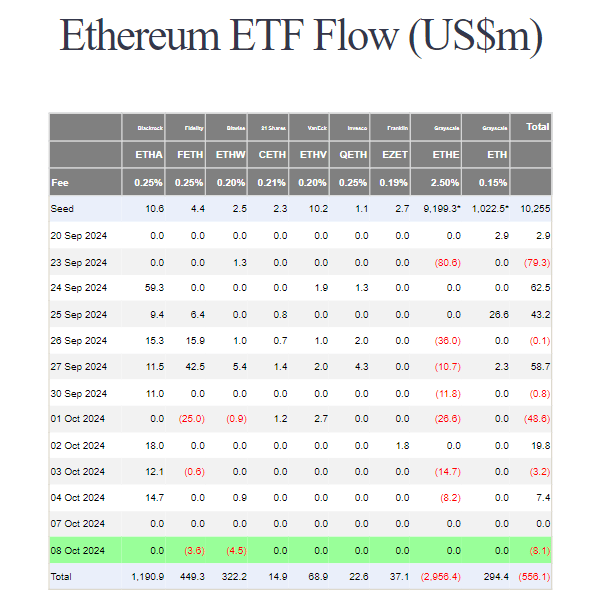
Ethereum ETF flows (Source: Farside Investors)
With regards to price movement, BTC saw its price drop by 0.16% over the past 24 hours of trading. As a result, the top crypto was worth about $62.173.60 at press time. ETH’s price managed to climb by 0.21% over the same time period, which means that the altcoin was worth about $2,434.04.
Crypto Markets Set for Liquidity Boost
Bitcoin and the broader crypto market could see fresh liquidity despite China's decision to halt economic stimulus measures, according to an analysis from QCP Capital. On Oct. 8, QCP Capital told its Telegram subscribers that they anticipate a capital reallocation into crypto markets, even as Bitcoin's price briefly dipped below $62,000 after news that China will not introduce further stimulus.
The firm acknowledged that there are still potential near-term downside risks for equities, especially with the upcoming US macroeconomic data and geopolitical tensions. However, they see crypto benefitting as an alternative risk-on asset. QCP Capital's outlook aligns with a growing optimism for Bitcoin and the broader crypto market heading into the final quarter of the year. Some analysts are still expecting Bitcoin to deliver gains in what has traditionally been a strong period for the asset.
While global liquidity trends are likely to support risk assets like Bitcoin through the end of the year, short-term factors like US earnings season and the Consumer Price Index (CPI) release could pose some challenges for equity markets. Despite this, QCP still has a positive medium-term outlook, and suggested that election-related news could also fuel movement in the crypto space.
Meanwhile, the US dollar's recent strength, which followed the China news, has created headwinds for crypto performance. The US dollar index (DXY) has been rising, and traders are cautious about potential short-term crypto price traps.
Majority of Crypto Investors Rely on DCA
While investors are taking a step back from ETFs, new investor trends are emerging. A recent survey by Kraken revealed that most crypto investors prefer using dollar-cost averaging (DCA) as their primary strategy when entering the market.
According to the survey of 1,109 crypto investors, 83.5% have used DCA, with 59% still using it as their main approach. DCA involves buying assets at regular intervals, regardless of price. Kraken researchers say it helps mitigate short-term price volatility and remove emotions from trading.
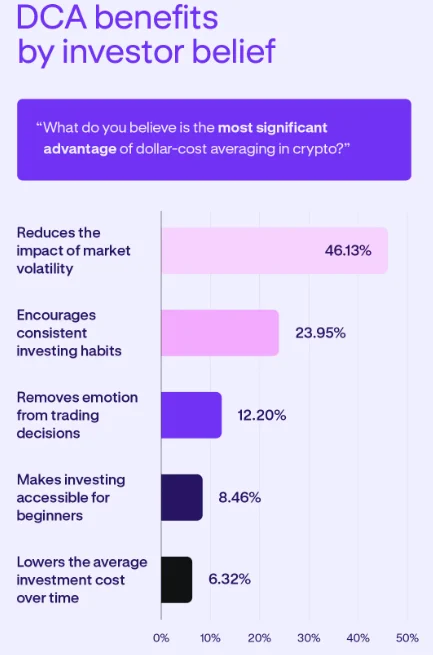
DCA benefits according to investors (Source: Kraken)
The survey also found that 46% of respondents believed the main benefit of DCA was hedging against market volatility, while around one-third valued its support for consistent investment habits. Approximately 12% believed that DCA helps remove emotions from trading.
The perceived advantages of DCA varied depending on income. Lower-income respondents, who are those earning under $50,000, considered consistent investment habits as the key benefit. Higher-income individuals, who are those earning between $175,000 and $199,000, prioritized DCA’s ability to reduce volatility.
Only 8% of respondents stuck to their DCA strategy when they faced losses, while those using other strategies were more likely to maintain their course during market turbulence. The survey also revealed a correlation between income and confidence in sticking to investment plans.
Almost 63% of those earning more than $100,000 reported a strong ability to stick to their strategy during market fluctuations. Higher-income investors were more likely to use DCA, while those earning less than $100,000 were more inclined to try timing the market.
Younger investors, aged 18 to 29, showed a preference for riskier strategies, with half attempting to time the market. In contrast, older investors over 45 were more vigilant about monitoring crypto markets, with two-thirds checking them more frequently than traditional investments, compared to only a third of younger investors who did the same.
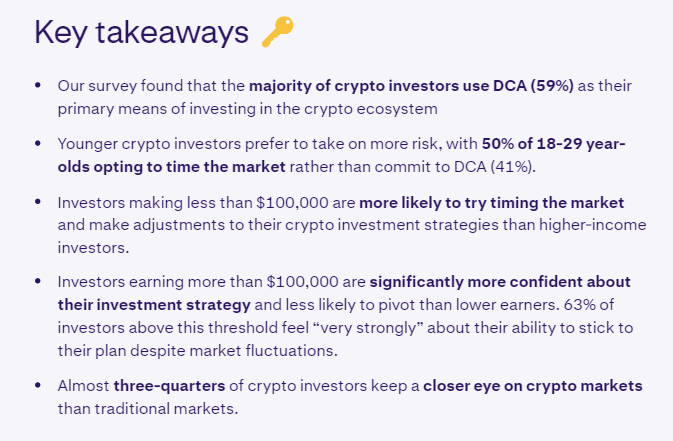
Some key takeaways from Kraken’s survey (Source: Kraken)
Kraken acknowledged that DCA may not be a perfect strategy, but the exchange suggested that it can reduce the stress of timing the market and help offset emotional decision-making.
